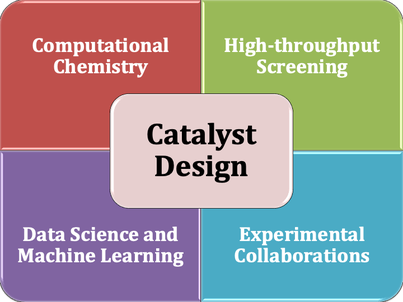2020 Virtual AIChE Annual Meeting
(3j) Accelerated Discovery of Next-Generation Catalysts Powered By Computational Chemistry and Data Science
Author
Catalysis is key to the production of fuels and chemicals. Estimates of the total value of fuels and chemicals derived from catalysts in the United States exceeded $900 billion/year in 2010. Fine chemicals are produced in lower amounts (typically <1000 tons/year) than petrochemicals, but they have much higher added value (>$10/kg) due to their structural complexity and functionality. Catalytic transformation of fine chemicals thus often involve complicated chemistry and require well-designed and precisely-tuned catalysts. While case-by-case exploration of catalysts for fine chemical productions has been pursued, high-throughput computational screening, which can greatly accelerate the discovery process, has not been reported for these reactions. Throughout my Ph.D. and postdoc, I have gained extensive experience in the computational study and design of both homogeneous and heterogeneous catalysts, for a wide variety of reactions including hydrolysis, esterification and oxidation. I have also learned state-of-the-art high-throughput screening and data science methods during my postdoc research. Building on my experience, my future research group will aim to tackle this problem by integrating high-throughput computational screening, atomistic molecular modeling and close collaboration with experimental groups to search for catalysts (including but not limited to zeolites, metal-organic frameworks (MOFs) and MOF-enzyme composites) for fine chemical transformations that are important to the chemical industry. The basic strategy of the research will be 1) for a given reaction, identify active motif in the known catalysts and search for them in structural databases, 2) for the potentially catalytic active materials from the search, score and rank them using metrics that are relatively easy to calculate, such as the adsorption energy of the substrate, 3) for the top ones, carry out more detailed mechanistic investigations to map out the reaction pathway and calculate the energy barrier, 4) the very top ones will be tested experimentally. Since the production and transformation of fine chemicals often occur in the liquid phase, solvation effects and diffusion rates will also be investigated in the study. Eventually, we will try to establish a database that collects all the reported data (both experimental and computational) for catalytic fine chemical transformation and organizes them by reaction and catalyst. With this database, we can also carry out large-scale data analysis to identify structure-activity relationships and use machine learning to predict new catalysts. The database can also greatly benefit the catalysis community and facilitate new discoveries.
Teaching Interests
My teaching interests include several chemical engineering core classes such as Thermodynamics and Kinetics. Also, being trained in a math-heavy chemical physics undergraduate program, I am able and willing to teach math courses such as Numerical Methods in Chemical Engineering. In addition, I plan to develop elective courses for higher-level undergraduates and graduate students such as âData Science and Machine Learning in Chemistryâ. I have accumulated significant teaching experience both in graduate school and during postdoc. In graduate school, I served as teaching assistant (TA) for two years and won the departmentâs Rieman Award for outstanding TAs in 2013. During postdoc, I continue to sharpen my teaching skills by guest lecturing in two chemical engineering courses: Applied Molecular Modeling (for seniors and graduate students) and Molecular Engineering and Statistical Mechanics (for juniors and seniors). These experiences, along with my mentorship of undergraduates and junior graduate students as a postdoc, have prepared me for successful teaching in a chemical engineering department.
